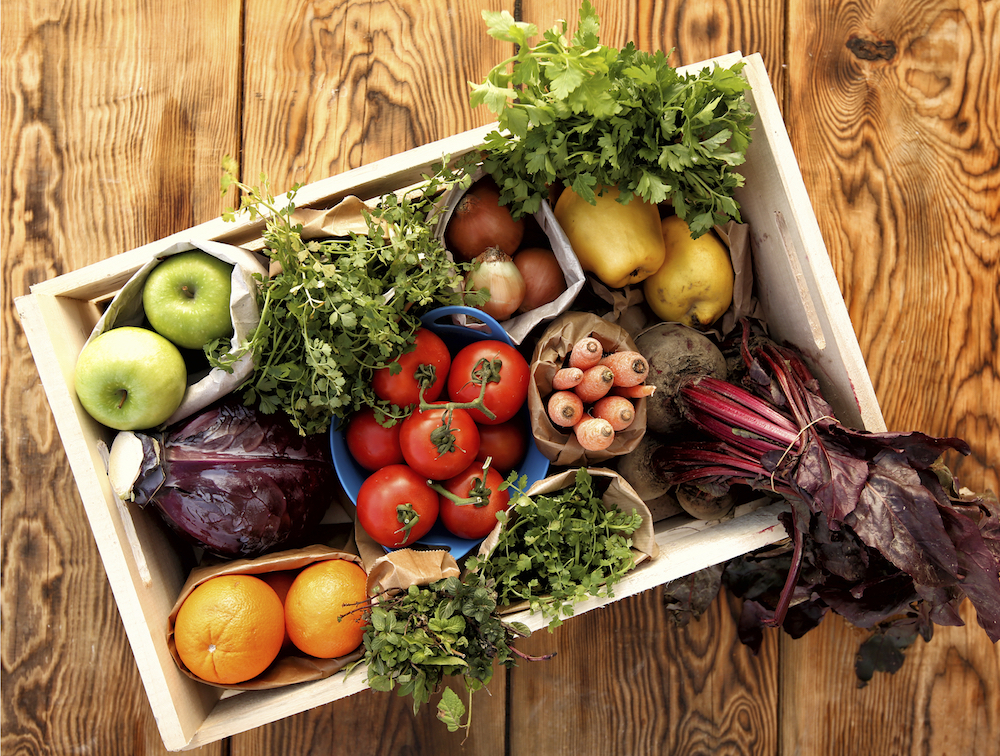Last Updated May 26, 2023.
We’ve all heard the adage, “an apple a day keeps the doctor away.” While it might take more than an apple to stay healthy, it is true that fruits and vegetables should play a big role in your diet. In fact, experts suggest that we incorporate 5-9 services of fruits and vegetables in our diets every day. Fresh fruits and vegetables are nutritious and delicious, but unfortunately can be some of the pricier items at the supermarket. Because of the cost, it can be tempting to forgo vitamin-rich produce for cheaper, less healthful choices.
One tip for spending less on fruits and vegetables is to shop for produce that is in-season. Items that you see in the supermarket during their off-seasons are more expensive since the stores need to recoup the costs for transporting and shipping the produce from where it was grown. Watermelon in the winter anyone? In-season produce is typically sourced from relatively local areas which means that there are less transportation expenses.
Seasonal produce also tastes better since it is allowed to ripen naturally outdoors and is picked at the peak of its flavor. Out of season fruits and vegetables are often harvested early and refrigerated during transit which can change the flavor and texture of the produce. The produce is also stored for longer periods of time which can reduce its nutritional value.
Enjoy a Cornucopia of Fresh Fall Fruits & Vegetables
Every season provides a bounty of fresh produce to choose from and autumn is no exception. This fall, stock up on these cool weather crops at the market and stretch your food dollars at the same time.
Pears
Move over summer peaches and say hello to fall pears! Pears are a good source of fiber, vitamin and potassium.
Serving/Recipe Idea: Eat pears on their own, sliced on a peanut butter sandwich or a cracker with cheese, or use them as the main ingredient in a sweet dessert like Roasted Maple Pears.
Pumpkins
A perennial favorite for everything autumn, pumpkins are super versatile fruit (yes, it is technically a fruit!) that find their way into all types of stews, soups, pies, cookies and much more.
Serving/Recipe Idea: Add some fall flavor to your breakfast or brunch with Fluffy Pumpkin Pancakes.
Brussels sprouts
Whether you like them roasted, steamed or stir fried, one thing is for sure – you’ll get a lot of nutrition from these miniature cabbages. A source of vitamins K, C, & B6, as well as folate and fiber, brussels sprouts are a healthy addition to your diet.
Serving/Recipe Idea: Surprise your next dinner guests with Honey Balsamic Roasted Brussels Sprouts, an easy-to-make side dish.
Cauliflower
Cauliflower may be available year-round, but it will probably be much less expensive during the fall when it is typically harvested. It is a good source of vitamins and nutrients including protein, thiamin, magnesium, fiber, and vitamins C, K and B6.
Serving/Recipe Idea: As an alternative to mashed potatoes (potatoes are another fall vegetable), try making Cauli-tatoes.
Butternut Squash
One cup of butternut squash provides a jumbo serving of 457% of the daily recommended dietary intake of vitamin A. Butternut squash is also rich in vitamin C, potassium and fiber. Aside from its nutritional benefits, this gourd is the foundation of so many fantastic fall dishes including soups, stews, casseroles, and even muffins and pies!
Serving/Recipe Idea: Pasta and butternut squash is a unique and delicious combination. Not convinced? Take a look at this mouthwatering butternut squash stuffed shells with sage browned butter recipe.
Some other in-season fruits and vegetables to consider adding to your autumn recipe repertoire include:
Acorn squash
Arugula
Beets
Cabbage
Carrots
Cranberries
Garlic
Kale
Pomegranates
Potatoes
Sweet potatoes & yams
Turnips
Don’t sacrifice good nutrition to save money. By planning your meals around in-season produce you can eat healthy and get more for your food budget dollars.
The information provided in this blog post is for informational purposes only. It should not be considered legal or financial advice. You should consult with a financial professional to determine what may be best for your individual needs.

Friendship Rewards Program
Refer a friend and get a $25 Omni Gift Card



